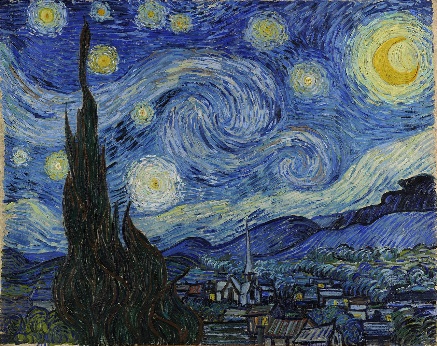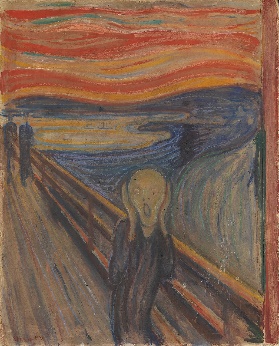|
|
Unit 7 Art
Lesson 1 Masterpieces
【学习目标】
You will be able to
1. read and talk about paintings and masterpieces
2. read for general understanding
3. read for specific information and understanding words in context
4. read for similarities between three different paintings
5. learn about and practise noun clauses
6. learn about and practise subject clauses, object clauses and predicative clauses
【学习重难点】
1. reading for specific information
2. Using noun clauses in context
【学习过程】
1. What do you see in the paintings?



2. Read the descriptions and find out what each painting is about.
The Starry Night
| The Scream
| The Empire of Light
| | | |
3. Read again, take notes and talk about each painting.
1. What does the painting show?
2. What may have inspired the painter?
3. What did the artist think or say about the painting?
4. Sort the expression on page 10 and then use them to practice introducing the paintings.
5. After reading the descriptions, do you like or dislike them more? Give your reasons.
Vocabulary you might need:
- the painting makes me feel uneasy/inspired,
|
6. Group Work: Suppose you are a volunteer at an art exhibition. Introduce one of the three paintings to the visitors.
7. Noun clauses, subject clauses, object clauses, and predicative clauses.
A noun clause is a dependent clause that acts as a noun. Noun clauses can act as subjects, direct objects, indirect objects, predicate nominatives, or objects of a preposition.
Example:
(1) Whichever restaurant you pick is fine with me. (subject—a subject clause)
(2) Do you know what the weather will be like? (direct object—an object clause)
(3) Be sure to send whoever interviewed you a thank-you note. (indirect object—an object clause)
(4) The focus of our work is how we can satisfy customers most effectively. (a predicate nominative—an predicative clause)
(5) It’s important to think about why we make certain decisions. (an object of a preposition—an object clause)
8. Combine the two expressions using a subject clause, an object clause or a predicative clause.
(1) I don’t know
What kind of a battery is this
__________________________________________________________________
(2) Scientists claim
They will cure cancer
__________________________________________________________________
(3) The news has been confirmed
He is still alive
__________________________________________________________________
(4) Our proposal
You should join in
__________________________________________________________________
(5) The only reason for my coining
because I hoped to see you again
__________________________________________________________________
9. Group Work Read the quotes. Discuss the features of good paintings.
A man paints with his brain and not with his hands.
— Michelangelo, an Italian painter
Painting is silent poetry, and poetry is painting that speaks.
— Plutarch, an ancient Greek writer
Good painting is like good cooking; it can be tasted but not explained.
— Maurice de Vlaminck, a French painter
|
|
![]() 川公网安备51152402000101号 )|网站地图
川公网安备51152402000101号 )|网站地图